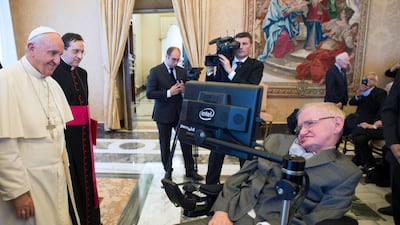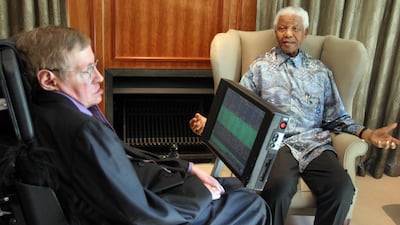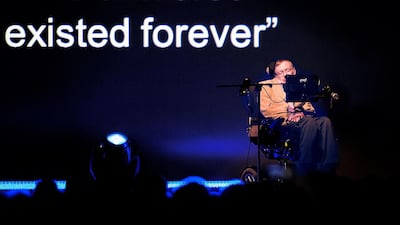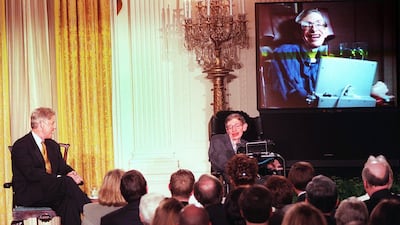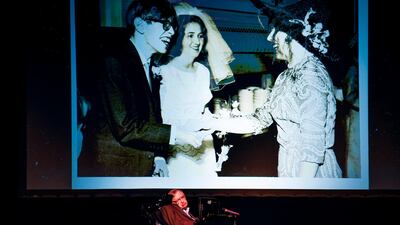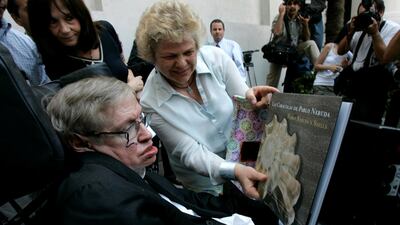Professor Stephen Hawking has died at the age of 76, his family has confirmed in a statement.
The British scientist was the author of A Brief History of Time and was diagnosed with motor neurone disease in 1963 at age 21.
"We are deeply saddened that our beloved father passed away today," Hawking's children, Lucy, Robert and Tim said in a statement carried by Britain's Press Association news agency.
"He was a great scientist and an extraordinary man whose work and legacy will live on for many years."
_____________
Stephen's Hawking's life in pictures:
_____________
Hawking was Britain's most famous modern-day scientist, a genius who dedicated his life to unlocking the secrets of the universe.
Born on January 8, 1942 – 300 years to the day after the death of the father of modern science, Galileo Galilei – he believed science was his destiny.
But fate also dealt Hawking a cruel hand.
Most of his life was spent in a wheelchair after he was crippled by amyotrophic lateral sclerosis (ALS), a form of motor neurone disease that attacks the nerves controlling voluntary movement.
Remarkably, Hawking defied predictions he would only live for a few years, overcoming debilitating effects on his mobility and speech that left him paralysed and able to communicate only via a computer speech synthesiser.
"I am quite often asked: how do you feel about having ALS?" he once wrote. "The answer is, not a lot.
"I try to lead as normal a life as possible, and not think about my condition, or regret the things it prevents me from doing, which are not that many."
___________
Read more:
Dr Jane Hawking: Her own theory on it all
Genius by Stephen Hawking challenges ordinary people to become extraordinary
Film review: The Theory of Everything
Eddie Redmayne on stepping into the shoes of a genius in The Theory of Everything
___________
Hawking, though, was far from normal.
Inside the shell of his increasingly useless body was a razor-sharp mind, fascinated by the nature of the universe, how it was formed and how it might end.
"My goal is simple," he once said. "It is complete understanding of the universe, why it is as it is and why it exists at all."
Much of that work centred on bringing together relativity – the nature of space and time – and quantum theory – how the smallest particles behave – to explain the creation of the universe and how it is governed.
In 1974, he became one of the youngest fellows of Britain's most prestigious scientific body, the Royal Society, at the age of 32.
In 1979 he was appointed Lucasian Professor of Mathematics at Cambridge University, where he had moved from Oxford University to study theoretical astronomy and cosmology.
A previous holder of the prestigious post was the 17th-century scientist Sir Isaac Newton.
Hawking eventually put Newton's gravitational theories to the test in 2007 when, aged 65, he went on a weightless flight in the United States as a prelude to a hoped-for sub-orbital spaceflight.
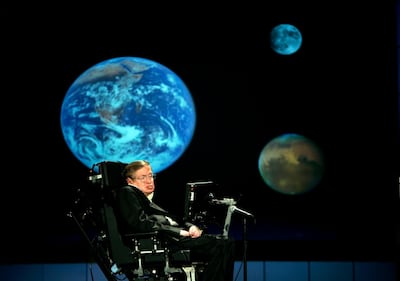
Characteristically, he did not see the trip as a mere birthday present.
Instead, he said he wanted to show that disability was no bar to achievement and to encourage interest in space, where he believed humankind's destiny lay.
"I think the human race has no future if it doesn't go into space," he said.
"I believe life on Earth is at an ever-increasing risk of being wiped out by a disaster such as sudden global warming, nuclear war, a genetically engineered virus or other dangers."
More recently he said artificial intelligence could contribute to the eradication of disease and poverty, while warning of its potential dangers.
"In short, success in creating AI could be the biggest event in the history of our civilisation.
___________
Read more:
Stephen Hawking and his five-decade fight with ALS
Stephen Hawking: A timeline of his life
___________
"Alongside the benefits, AI will also bring dangers, like powerful autonomous weapons, or new ways for the few to oppress the many," Hawking said in 2016 at the opening of a new AI research centre at Cambridge University.
Hawking's genius brought him global fame and he become known as a witty communicator dedicated to bringing science to a wider audience.
His 1988 book A Brief History of Time sought to explain to non-scientists the fundamental theories of the universe, and it became an international bestseller, bringing him global acclaim.
It was followed in 2001 by The Universe in a Nutshell.
In 2007, Hawking published a children's book, George's Secret Key to the Universe, with his daughter, Lucy, seeking to explain the workings of the solar system, asteroids, his pet subject of black holes and other celestial bodies.
Hawking also moved into popular culture, with cameos in Star Trek: The Next Generation and The Simpsons, while his voice appeared in Pink Floyd songs.
Beyond scientific debate Hawking also weighed into politics, describing Donald Trump as "a demagogue who seems to appeal to the lowest common denominator" ahead of his election as US president.
Hawking also warned Britain ahead of the Brexit referendum in 2016 against leaving the European Union: "Gone are the days when we could stand on our own against the world."
Hawking married Jane Wilde in 1965, and the couple had three children. They split after 25 years, and he married his former nurse, Elaine Mason, but the union broke down amid allegations, denied by him, of abuse.
The love story between Hawking and his first wife was retold in the 2014 film The Theory of Everything, which won Britain's Eddie Redmayne the best actor Oscar for his portrayal of the scientist.
The Oscar triumph was celebrated by Hawking, who reportedly said there were moments watching the film when he thought he was watching himself.
He was also the subject of a 2013 documentary, Hawking, in which he reflected on his life: "Because every day could be my last, I have the desire to make the most of each and every minute."
Dr Jane Hawking, the author and his first wife, paid tribute to him in an interview with The National last week.
“I thought there must be a loving God acting in his life because he might not have been gifted with the brain of a genius which enabled him to do the science that he could do. He couldn’t walk, he was having difficulty talking, he couldn’t write,” she said.
"All he could do was think, but he could think in such an extraordinary way, in a way not given to many people – to himself and Einstein perhaps, but not many others. And that seemed to me to be the most extraordinary gift."
* with AFP


